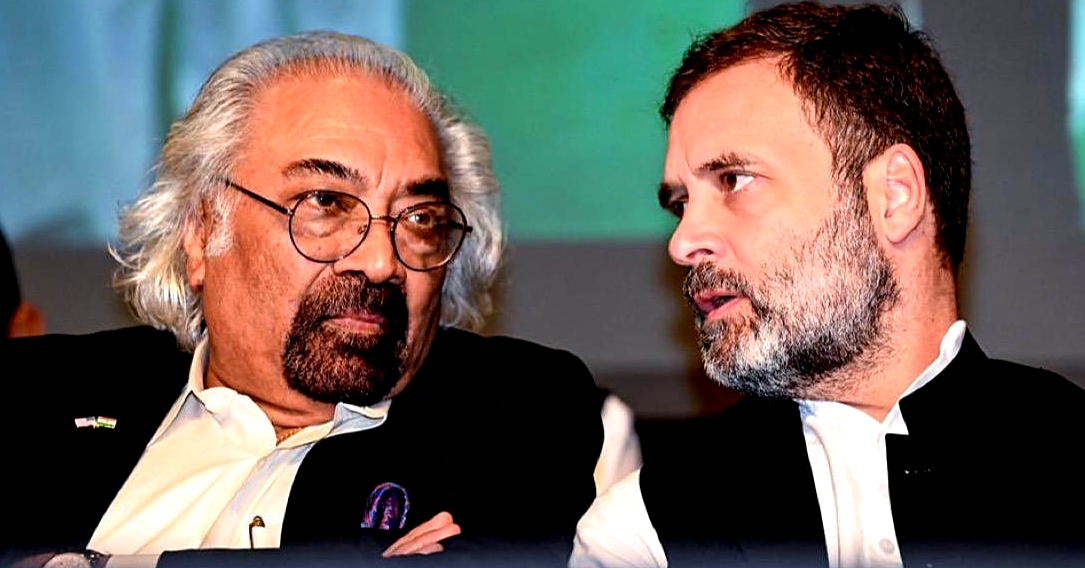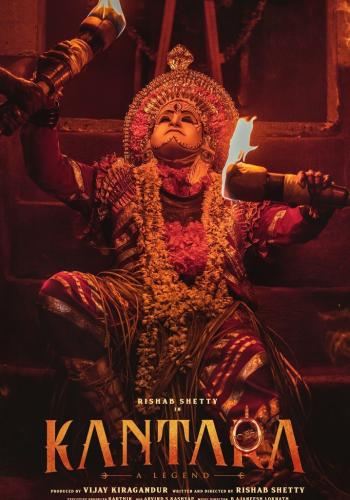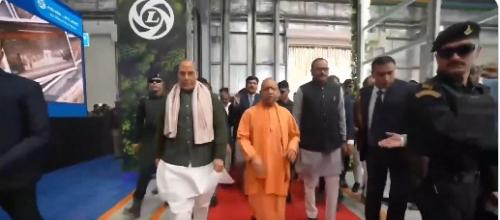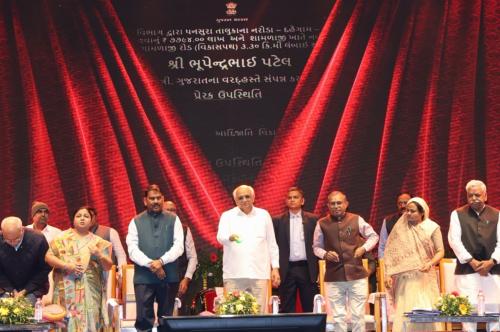By J.V. Lakshmana Rao & Prasad Peketi
Sam Pitroda, the recently re-appointed chairman of the Indian Overseas Congress, has lavished praise on Rahul Gandhi, portraying him as an intellectual strategist, who surpasses his father, Rajiv Gandhi, in mental maturity.
Sam Pitroda has been a loyal supporter of Rajiv Gandhi. It was Rajiv Gandhi, who had recognised Sam Pitroda’s abilities as a famous technocrat, appointed him as India’s top telecom job and advisor the then government of India. Sam Pitroda’s loyalty to the Gandhi family is unquestionable. But when he heaped praises on Rahul Gandhi, the people have started thinking of mental make-up of Sam Pitroda, who is in his 80s.
Sam Pitroda sympathises with Rahul Gandhi, by saying “Poor Rahul has gone through two big shocks in his life -- death of his grandmother and his father,” implying Rahul Gandhi deserves to be the Prime Minister of India.
According to Sam Pitroda, the media's portrayal of Rahul Gandhi as a "Pappu" is part of a well-orchestrated campaign funded by millions of dollars, aimed at maligning a "highly educated" individual. However, despite Pitroda's glowing endorsement, it's crucial to critically assess Rahul Gandhi's political career and his fitness to lead a nation as complex and diverse as India. The reality is that Rahul Gandhi has repeatedly demonstrated a lack of political maturity and an inability to rise to the occasion as a dignified leader. Worse still, his actions and statements often seem to align more with foreign agendas than with the national interest.
“Mr. Clean’ vs. ‘Pappu:” Another example of misjudgement by Sam Pitroda is his comparing Rahul Gandhi’s intellect with that of Rajiv Gandhi. Sam Pitroda says: “I had an opportunity to see many prime ministers from very close quarters but the difference between Rahul and Rajiv may be that Rahul is much more intellectual, thinker, Rajiv was a little more doer.” While Rajiv had been recognized as “Mr. Clean,” Rahul has acquired the political identity as “Pappu.”
Rahul Gandhi's political journey has been marked by a series of missteps that reflect his lack of maturity as a politician. Unlike his father, Rajiv Gandhi, who was a “decisive doer,” Rahul has often wavered in his decision-making, flip-flopping on crucial issues. His infamous remark on the ordinance protecting convicted lawmakers as "nonsense" in 2013, while being part of the government, not only embarrassed his party but also showcased his impulsive and reckless approach to serious matters. During No-Confidence motion, Rahul Gandhi hugged Narendra Modi and winked at his fellow Lok Sabha MPs. Such behaviour is not indicative of a strategic leader but rather of an individual who lacks the maturity and discipline necessary in politics.
During the 2019 general elections, Rahul Gandhi chose to focus on the Rafale deal, alleging corruption without substantial evidence. This strategy backfired spectacularly, as the Supreme Court of India dismissed the allegations, and the BJP turned the tables by accusing Rahul Gandhi of playing into the hands of foreign powers that wished to see India weakened. Moreover, Rahul Gandhi's lack of consistency and clarity on policy issues has further eroded his credibility. He has been known to change his stance on economic policies, such as GST and demonetization, depending on the political climate, rather than sticking to a well-thought-out position. This indecisiveness is a far cry from the resolute leadership required to steer a nation through challenging times.
Playing into Hands of Foreign Forces: One of the most concerning aspects of Rahul Gandhi's political career is his apparent willingness to align with foreign forces that do not have India's best interests at heart. His frequent trips abroad, during which he criticizes the Indian government, raise serious questions about his loyalties. Pitroda's defense of Rahul's actions as simply doing his job as an Opposition leader fails to acknowledge the damage such rhetoric can cause to India's image on the global stage.
For example, Rahul Gandhi's comments on the abrogation of the Article 370 in Jammu and Kashmir were seized upon by Pakistan and used as propaganda against India in international forums. His statements were cited in Pakistan's dossier submitted to the United Nations, providing fodder for anti-India sentiments. This is not the behaviour of a responsible leader who puts the nation first; rather, it is indicative of someone who is either naïve or deliberately playing into the hands of India's adversaries.
Questionable Intellectualism: Sam Pitroda's portrayal of Rahul Gandhi as an "intellectual thinker" is not supported by Rahul's track record. Despite being educated at prestigious foreign institutions like Cambridge, Rahul has often struggled to articulate coherent policy positions or present a vision for India's future. His public speeches are frequently marred by gaffes, simplistic slogans, and a lack of depth in understanding complex issues.
For instance, during a speech in Germany in 2018, Rahul Gandhi bizarrely linked the rise of ISIS to unemployment in India, a statement that was widely ridiculed for its absurdity and lack of context. Such remarks do not reflect the intellectualism that Sam Pitroda attributes to Rahul Gandhi; instead, they reveal a politician who is out of touch with reality and prone to making ill-informed statements on global platforms.
‘Pappu’ Image His Own Making: While Sam Pitroda blames the media for creating the "Pappu" image, it is important to recognize that this image is largely a result of Rahul Gandhi's own actions and statements. His repeated failures in elections, inability to connect with the electorate, and lack of a clear ideological stance have contributed to the perception that he is not a serious politician.
The "Pappu" label gained traction because of incidents like Rahul's infamous "earthquake" remark in 2016, where he claimed that his speech in Parliament would cause an earthquake across the country. When the time came, however, his speech was underwhelming and devoid of substance, leading to widespread mockery. Such instances have only reinforced the perception that Rahul Gandhi is not equipped to lead a nation of over a billion people.
The Role of Dynastic Politics: Another critical factor in Rahul Gandhi's political journey is the role of dynastic politics. Unlike leaders who have risen through the ranks based on merit and hard work, Rahul Gandhi's ascension in the Congress Party is largely due to his lineage. This sense of entitlement has prevented him from engaging in the kind of rigorous self-examination and growth that is necessary for any leader and that is the primary reason for mass leaders like Himanta Biswa Sharma, Jyothiraditya Scindia, Capt. Amirinder Singh deserting Congress and joining rival BJP.
Rahul's reliance on his family's legacy rather than building his own political identity has also contributed to his lack of credibility. Voters are increasingly looking for leaders who are self-made and who understand the struggles of ordinary citizens. Rahul Gandhi's privileged upbringing and detachment from the ground realities of India make it difficult for him to resonate with the masses.
Blitz Article on Rahul Gandhi: Recently, Bangladesh's leading newspaper, Blitz, published a scathing exposé on Indian politician Rahul Gandhi, alleging involvement in drug abuse and providing details about his personal life, including his marriage. The article claims that Rahul Gandhi has been entangled in substance abuse, which has reportedly affected his political judgment and public behaviour. Blitz also delved into his personal relationships, raising questions about his marital status, and suggesting that these issues have been deliberately concealed from the public eye to maintain his political image. This exposé by Blitz has sparked significant controversy, Raghunandan Rao, MP from Medak, has carried the copies to Rahul Gandhi office and requested inputs from Rahul Gandhi on the report. This report portrays a side of Rahul Gandhi that is largely unreported by mainstream Indian media, further complicating his already tumultuous political career.
Contrast with Modi's Leadership: In stark contrast to Rahul Gandhi's erratic and immature leadership, Prime Minister Narendra Modi has demonstrated the qualities of a seasoned statesman. Modi's decisive actions, such as the implementation of GST, demonetization, and the abrogation of the Article 370, reflect a leader who is willing to take bold steps in the national interest, even at the risk of facing criticism.
Narendra Modi's ability to connect with the electorate, articulate a clear vision for India's future, and maintain a strong and dignified presence on the global stage has set a benchmark for leadership that Rahul Gandhi has failed to meet. While Narendra Modi's leadership has its critics, it cannot be denied that he has consistently demonstrated the qualities of a mature and effective politician.
Danger of Foreign Influence: Rahul Gandhi's apparent alignment with foreign narratives poses a significant risk to India's sovereignty and security. In an increasingly multipolar world, India needs leaders who are deeply rooted in the national interest and who can navigate the complex geopolitical landscape without compromising the country's integrity.
Rahul's interactions with foreign entities, coupled with his criticism of India on international platforms, suggest that he is more interested in gaining approval from external forces than in safeguarding India's interests. This is a dangerous precedent that could have long-term implications for India's standing in the world.
Political Immaturity: Sam Pitroda, who was suspended before general elections for his comments on the distribution of wealth and after election his suspension was revoked without any proper explanation and his attempt to portray Rahul Gandhi as an intellectual strategist, who is unfairly maligned by the media, does not stand up to scrutiny. The reality is that Rahul Gandhi has consistently demonstrated a lack of political maturity, a tendency to align with foreign forces, and an inability to articulate a clear and coherent vision for India. In contrast, leaders like Narendra Modi have shown what it takes to lead a nation with dignity, decisiveness, and a deep commitment to the national interest.
India deserves leaders who are not only capable and mature but also deeply connected to the country's values and aspirations. Rahul Gandhi, with his erratic behaviour and questionable loyalties, does not fit this mold. As the nation looks to the future, it is imperative that we critically assess our leaders and hold them to the highest standards of integrity and patriotism. Rahul Gandhi, despite the accolades from figures like Sam Pitroda, has yet to prove that he is worthy of the responsibility of leading India.











